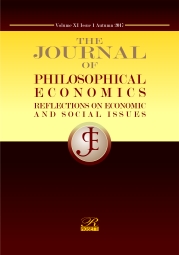- Volume I Issue 1 (Autumn 2007)
- Volume I Issue 2 (Special issue 2008)
- Volume II Issue 1 (Autumn 2008)
- Volume II Issue 2 (Spring 2009)
- Volume III Issue 1 (Autumn 2009)
- Volume III Issue 2 (Spring 2010)
- Volume IV Issue 1 (Special issue 2010)
- Volume IV Issue 2 (Spring 2011)
- Volume V Issue 1 (Autumn 2011)
- Volume V Issue 2 (Spring 2012)
- Volume VI Issue 1 (Autumn 2012)
- Volume VI Issue 2 (Spring 2013)
- Volume VII Issue 1 (Autumn 2013)
- Volume VII Issue 2 (Spring 2014)
- Volume VIII Issue 1 (Autumn 2014)
- Volume VIII Issue 2 (Spring 2015)
- Volume IX Issue 1 (Autumn 2015)
- Volume IX Issue 2 (Spring 2016)
- Volume X Issue 1 (Autumn 2016)
- Volume X Issue 2 (Spring 2017)
- Volume XI Issue 1 (Autumn 2017)
- Volume XI Issue 2 (Spring 2018)
- Volume XII Issue 1 (Autumn 2018)
- Volume XII Issue 2 (Spring 2019)
- Volume XIII Issue 1 (Autumn 2019)
- Volume XIII Issue 2 (Spring - Autumn 2020)
 | The Journal of Philosophical EconomicsEditor: Valentin Cojanu |
ARTICLES
Unusual Humean issues in materialistic political economy (Andrea MICOCCI)
Abstract: Capitalism as we know it presents typical dialectical features that isolate it from nature, in which real oppositions make evolution revolutionary: A dialectical metaphysics replaces the free flow of events allowing capitalist relationships but preventing the practice of materialism. Some radically sceptical issues in Hume’s Enquiry Concerning Human Understanding, Dialogues Concerning Natural Religion and A Treatise of Human Nature come useful here. A materialistic approach with complete (i.e., non-dialectical) ruptures in fact dovetails with Hume’s argument on the unpredictability of nature and the predictability of human social activities. As a consequence, a thus renewed materialistic political economy concerned with the concrete must work out its own categories dynamically, to discard them once they have been proved metaphysical. Read the article ...
Growth theory after Keynes, part II: 75 years of obstruction by the mainstream economics culture (Hendrik VAN DEN BERG)
Abstract: Part I of this essay explained the sequence of events that enabled the neoclassical paradigm to regain its dominant position in mainstream economics following serious challenges by ‘Keynesian’ economists. This second essay seeks to answer the question of why the economics profession was so willing to sustain the neoclassical paradigm in the face of the reality-based challenges by ‘Keynesian’ economists like Harrod and Domar. The answer is sought in the culture of economics, the history of science in general, and the study of power in the field of political economy. This article draws heavily on the work of the French sociologist Pierre Bourdieu, who divides culture into habitus (procedures and dispositions) and doxa (more abstract beliefs and philosophies), in order to provide insight into how culture affects economic thinking. Bourdieu’s concept of symbolic violence helps to explain how a narrower neoclassical growth model was enthusiastically accepted as a replacement for the ‘Keynesian’ Harrod-Domar growth model. Financial and business interests clearly understood the power of culture and they used their accumulated wealth to support the neoliberal doxa and neoclassical habitus that would induce economists to willingly provide intellectual cover for policies that benefitted those financial and business interests. We conclude with a discussion on how the history of thought on economic development might have evolved if the Keynesian paradigm, and its dynamic Harrod-Domar model, had prevailed. Read the article ...
Behavioural controversy concerning homo economicus: a Humean perspective (Khandakar ELAHI)
Abstract: In his monumental masterpiece, A Treatise on Human Nature, which explains the methodology of human reasoning concerning matters of fact and describes the roles that passions and morals play in it, Hume arrives at an enormously interesting maxim: An academic controversy cannot continue for long unless the disputants assign different meanings to the major terms employed in the debate. This theory has been applied in this paper to examine the behavioural criticisms about Homo Economicus (HE), the pivotal perception in the neoclassical microeconomic model.To achieve this objective, the paper discusses the origin and evolution of the concept, reviews behavioural criticisms, summarises the main tenets of Hume’s philosophy of human knowledge and finally examines the behavioural opinions from Hume’s perspective. The paper concludes that Hume’s theory convincingly explains the reason why the HE controversy is continuing for over half century- a fact that both the mainstream and behavioural economists are ignoring. Read the article ...
Dividing a cake (or) Distributional values in the measurement of economic inequality: an expository note (S. SUBRAMANIAN)
Abstract: ‘Distributional judgments’—judgments on the extent of inequality in the distribution of income and wealth—are routinely made by economists in exercises aimed at comparing inequalities in alternative situations. Yet the measurement of inequality is informed by certain nuances, which it would do well to be attentive to. In particular, the values underlying measurement protocols are not always made explicit, which tends to lend a somewhat misleading semblance of ‘value-neutrality’ to the activity of measurement. It is argued, with specific reference to the problem of inequality measurement, that such an orientation can compromise the possibility of accurate diagnosis and appropriate policy prescription. There is little that is original in this article, and much that is owed to the pioneering contributions of Serge-Chritophe Kolm. The emphasis throughout is on explicating an important issue through a deliberate effort at achieving simplicity in both argument and expression. Read the article ...
Review of Cheryle Desha and Karlso ‘Charlie’ Hargroves, Higher Education and Sustainable Development: A model for curriculum renewal, London: Routledge, 2014, 268 pp., hb, $180.00, 9781844078592, pb, $49.95, ISBN 9781844078608 (R. Edward DI COLLALTO) Read the article ...
Review of Ole Bjerg, Making Money: The Philosophy of Crisis Capitalism, London: Verso, 2014, 256 pp., pb, £19.99, ISBN 9781781682654 (Georgios PAPADOPOULOS) Read the article ...
Review of David Stuckler and Sanjay Basu, The Body Economic: Why Austerity Kills, New York, Basic Books, 2013, hb, 240 pp., $26.99, ISBN 9780465063987 (Jorge TAMAMES) Read the article ...
